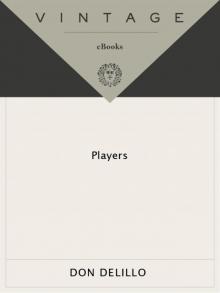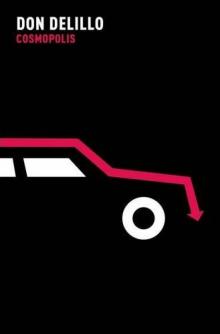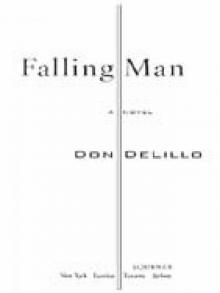- Home
- Don DeLillo
Running Dog Page 16
Running Dog Read online
Page 16
“You didn’t take part directly. Enough fun just watching from the sidelines. But you’ve matured, haven’t you? Terror isn’t the erotic commodity it used to be. We know too much. We’ve seen. We’ve taken up organic gardening.”
“You think I’ve matured, do you?”
“Somewhat,” he said. “To a certain extent. Enough so that you’ve drawn a line.”
The smile. The head tilting right.
“What you think is taking place, I’m flat-out telling you it’s not that way. To the extent I straightened out the alliances for you once before, that’s the way it still stands. There you go now. Putting me on the defensive again.”
“In the flesh you have your convincing moments. I’m the first to admit.”
“We have this tension. The air’s a little crackly. Maybe I shouldn’t let it bother me. Maybe it’s auspicious. It might be I’m misreading the thing completely. Sometimes tension’s to be encouraged. Sure, tension’s a bitch of a stimulant sometimes. See, down home everything’s so smooth, so mellow, a man can be put off by the little mocking noises he hears in a place like New York. Sure, these little whipcracks, these hard edges. Personal relations work like machinery. The air is taut. People know what they want. There’s a rasp, a little machinelike whine you hear in conversations in restaurants and shops. Women walk around with little numbers clicking behind their eyeballs. I wonder what they’re seeing in there. My impression, New York women, they’re always keeping something in reserve, holding it back, saving the little extras. Who for, who for? Their analysts. That’s why bald-headed Jews always look so happy. Nobody keeps a secret from a bald-headed Jew. They get all the leftovers, the most interesting parts, the greasiest and wettest and sweetest and best. Let me figure out how to decipher this suspense between us. I want to see if I can find out what it is people enjoy about these uneasy codes they keep sending into the air, all this nervous strain. Tension’s an edge, that must be it, a goading force, a heightener. It betokens something good. Maybe there’s a wild time in the works. What do you think? Who knows? Some all-out supersonics.”
He started edging toward her again. Twilight. The cab moving uptown now. Fifth Avenue’s taupe stone buildings. That surfer’s gleam rising to Mudger’s face. His lustrous blue eyes seemed to have been attached to him independent of his other features. They were devices of a sensitivity and distinctness she didn’t associate with Mudger, although she was willing to consider the possibility she was wrong. All she had to do was recall the number of varying moods he’d already composed and demolished in the relatively brief time they’d been in the taxi together.
She would have liked to suspend judgment, somehow to sabotage her own capacity to perceive the crux of things. When she was with Mudger earlier, in Virginia, sitting under the scarlet oaks, she’d felt they were communicating from either side of a semitransparent curtain or theatrical scrim. It was a weakness of hers. She liked drifting into strange terrains. It was what she’d had for a while with Selvy. That other son of a bitch. That son of a bitch in entirely different ways.
But things were clearer now. She was able to follow this man’s line of attack, or that man’s, or the other’s, nearly to the end. The only real question remaining was a rhetorical one, a lament, uttered solely for effect. Who are these bastards and what do they want?
They passed a horse-drawn cab, four tourists huddled in the chill. Some kids chased each other across the road, causing the driver to start mumbling. Mudger sat with his head tilted back. She noticed the cuts and crosshatchings on his fingers, the eroded skin near his thumbnails.
“Who are you sleeping with these days?” he said.
“That’s what my father used to ask me.”
“Was he jealous?”
“Just sophisticated, that’s all, and a little stupid.”
“You should have slept with Percival. He knows interesting people. You could have had some sneaky fun. Junkets galore. You could have written a book. Lloyd’s into everything. He’d love having someone like you to show off for. We talk, Lloyd and I. Not directly. There are channels. It never hurts to stay in touch.”
He was getting ready to deliver another preemptive speech. Moll had noticed during their first meeting how he tried to establish prior rights to convictions and views he assumed she held. A tactic she found amusing.
“People are born conservative. They have to learn how to be liberal. In substance, at the bedrock, we’re all of us conservative. People at the helm, I’m talking about. Lloyd’s an instance of this. Slowly, surely reverting. Progress, mild reforms, old Lloyd’s made a name. But those are the gleanings, the accidents, the random accretions. It all slides off eventually. It becomes sheer biology at a certain point.” Here he smiled thinly, as though anticipating a joke on himself. “You return to your origins. What’s old age but a kind of jaded infancy? You get physically smaller. You start to babble. You become sexually neuter.”
“Poor Lloyd Percival.”
“Now, myself, I’m getting out before any of those dire things can happen to me.”
“Yes, you’ve said.”
“The corollary to secrecy and power in this country is self-pity. I want to avoid that if I can.”
The meter read twenty-one dollars.
“We’re not getting anywhere, Earl.”
“At least you call me by my name.”
“It signifies an end to tension. To all these energies you tell me you detect in the air.”
“I only sense what’s there.”
“Ride’s over.”
“That’s regrettable.”
“Your specialized bullshit versus my debased sensibility.”
“She’s warming up at last.”
“If bullshit was music, you’d be a brass band.”
“Don’t stop now.”
“It’s over, really.”
“What else do you have?”
“Nothing else,” she said.
Mudger leaned toward the bulletproof partition.
“Flip an L,” he told the driver.
“Flip an R. Flip an L.”
“Old man doesn’t like me, it appears.”
“He belongs in the archives,” the driver mumbled into his steering wheel.
“Picturesque old character.”
“He’s an oral history. Keep talking. I’ll find a museum.”
“Ought to be driving a hansom. You ought to be driving a hansom cab with a colorful personality like that.”
Mudger sat back, smiling. It was an unsatisfactory way to end. Caricatures and gibes. Moll felt an injustice was being done to her own feelings, which were complex.
A downpour hit. The cab was stopped outside her building. Mudger sat in darkness, looking straight ahead. He didn’t speak until Moll reached for the door, and then very quietly began. With rain beating down on the hood and roof, she had to concentrate intently to hear.
“I’ve seen you in motion, physically, only once. Walking toward my house that time. Getting out of the limousine and coming slowly toward the house. I remember it. It’s engraved. It’s the clearest picture I have of you. Physically in motion. Long legs. Long legs kill me. I’d die for long legs. I see you walking. You’re tentative, not knowing really where you are. It’s a lovely, a choice body. Forgive the crudeness. It’s a choice body. Then you’re standing still. Watching me in the doorway. I’d love to get my hands on that body. That’s a little strong. That’s crude. A little violent-sounding. But it’s what I’d love to do. My hands, those legs. Feel those long legs wrapped around me. That’s what I was thinking in that doorway. First time I saw you. Love to get my hands on that body. Has to happen, I thought. Must happen. I want that bitch. We’ll fuck each other dizzy. We’ll be walking in circles for two weeks. I’m trying not to be crude. Although I don’t think you mind. You’re way beyond minding a thing like that. Woman like you. Long legs like yours. You don’t mind a little rough language, a touch of the unrefined. Legs like yours, and I’m only speculating, yo
u can’t possibly be put off by a little directness, a crude word now and again. This is number two. Second time I’m watching. Only this time you’re walking away. Cunt. Aren’t you? Only this time you’re leaving, not arriving. Aren’t you? Cunt. Bitch. Cunt.”
He spoke softly all the way through, almost wistfully, even to the very end, so that his words were touched with a curious melancholy, a tone of longing. This was strange, of course, the voice he’d chosen, considering what he had to say. It was like a formal recital. Something learned for school. Yes, a recitation. A factual and rather pretty narrative. A calm and beautifully detached and rather touching enumeration of small truths.
She walked in the rain to the front door. Upstairs the first thing that caught her eye was the smoking pistol, the neon sculpture she’d bought to commemorate the final evening she’d spent at Frankie’s Tropical Bar. With that other son of a bitch. That son of a bitch in entirely different ways. It was all so strange. She stayed depressed a long time.
The phone in Mudger’s car was mounted on a panel behind the front seat, passenger side. When it buzzed he put his left foot on the accelerator, leaned far to his right and extended his arm over the seat to reach it, without taking his eyes off the road.
His driver had left a week earlier to take a job with the National Park Service in Arizona. Doctor’s orders, he said. Dry climate. Mudger knew he was going back to PAC/ORD.
It was Lomax in Dallas.
“Some progress, Earl.”
“Tell me about it.”
“I made contact. In fact I flew down on the kid’s plane. What they call a carnival atmosphere prevailed.”
“How’d you manage that?”
“Easy,” Lomax said. “But I haven’t located the item. Next step is the warehouse. Richie’s jittery but I think I can get us inside.”
“They have a moat, I understand, with crocodiles.”
“They have dogs is what they have. It’s a lot more secure than the DC-9.”
“I heard from Van,” Mudger said.
“Where is he?”
“Southwest Texas.”
“How’s his face? Still hurt?”
“They found the subject.”
“Jesus, did they? That’s fantastic. Okay, you said it. They’d get it done. Had me fooled, I admit. No more snide remarks about the rangers.”
Mudger passed a Mercedes on the Jersey turnpike, heavy rain, the phone cradled between his head and shoulder.
“He wants to be found.”
A pause while Lomax considered this.
“Explain, Earl.”
“He wants to be found. That’s the explanation. How the hell else could they have found him?”
“Why does he want to be found?”
“I don’t know.”
“Are they fixed or traveling?”
“They’re still traveling.”
“Where to, you think?”
The Mercedes came into view on the left. Mudger increased his speed.
“He’s heading for the Mines.”
“I guess, if he’s led them down that far, could be.”
“Sure, he’s heading for the Mines.”
“Does Van know he’s being led?”
“Tell you the truth, Arthur, he was so goddamn happy I didn’t have the heart to tell him.”
Cao walked away from the roadside stand, eating a taco. He got into the microbus and Van drove off, obviously impatient. Propped on the dash was a Polaroid photo Cao had taken of his buddy standing in front of the statue of Davy Crockett in the town square in Ozona.
2
Talerico inspected the plants arrayed along the picture window in the living room. A police car turned into the street and went slowly past. Yellow cruisers. Cops with small neat mustaches, like army officers in World War I movies. He watched the car turn a corner and head toward the golf course. His wife had overwatered the Swedish ivy. He’d have to mention it.
His daughters kept asking about the Mounties. They’d seen pictures somewhere. Bright red tunics and wide-brimmed hats. The famous musical ride. Talerico didn’t think of them as Mounties. They were the RCMP and if they wore bright red uniforms while bouncing around on their horsies, they weren’t always easy to spot the rest of the time. He’d also been made aware of the provincial police. Not to mention the Toronto morality squad, whose officers liked to keep busy confiscating equipment and prints, and padlocking bookstores, peep shows and other outlets.
Talerico had come up from the Buffalo arm to develop Toronto for hard-core, if and when it became legal. In the meantime he was dipping and dancing, teasing along the margins of what was legally distributable, checking out the under-the-counter trade and making contacts with local people the family might want to install as corporate officials.
His smallest daughter came into view, out on the lawn, playing with friends. After Buffalo, a city of sofa burnings and larger conflagrations, this place was easy to take. The kids, especially, loved it. His wife was right behind. He, Vincent, harbored secret yearnings for the familiar faces and voices. The mother, the sister, the cousins, the uncles, the nieces.
Still, it was only a couple of hours’ drive to Buffalo and to all those smoldering ruins that were constantly being hosed down by overworked firemen. Here, once a week, to ease the longing for familiar things, he drove down to Pasquale Brothers on King Street and filled a couple of shopping bags with cheese, noodles, peppers, sausage, cold cuts, anchovies and olives.
He checked his watch. Two-hour time difference. Still a little early to call.
Talerico suffered from a facial nerve paralysis. About a year ago he got out of bed one morning to find that the right side of his face had more or less collapsed. It had slid down, like an acre of mud. He had trouble closing his mouth completely; the right corner didn’t quite shut. His bushy mustache dipped far to the right and his voice occasionally sounded hollow.
The split was distinct. The left side of his face was normal. The right side was numb and set lower than the left. The right side was also expressionless. When he sneezed or blinked, only the left eye closed. The right eye hung there, frozen, staring blankly. It was slanted down, at an angle to the other eye. It was like an animal’s eye, people said. A hawk, a snake, a shark. It was mysterious and fierce, staring out impassively, uninfluenced by what was happening on the other side of his face.
Vinny the Eye.
He went downstairs to the den. The phone down there was attached to a device called a blue box. It was roughly four by six inches, inlaid with digital keys. By dialing out-of-service numbers in nearby communities and then activating the blue box, he was able to switch the calls to points anywhere in the U.S. or Canada while being billed only for the short-range connections. It’s the little things that give you the edge.
The long-distance target this time was Dallas. A man Talerico knew only as Kidder. He’d been told Kidder had a multiple answering service. On the ninth or tenth ring, a man picked up.
“B and G Realty.”
“I want Kidder.”
“Wait a second, I’ll transfer.”
Half a minute later a woman came on.
“Sherman Kendall Catering.”
“Kidder.”
“Who do I say?”
“Vincent Talerico.”
He heard whispering. About five seconds of breathing. In the background a phone rang and the woman answered: “Tall Man Fashions.”
Talerico heard the original male voice.
“Vinny Tal.”
“Is this Kidder?”
“Talking.”
“Do we know each other?”
“You know me as Sherman Kantrowitz. Or Sherman Kaye.”
“Sure,” Talerico said.
“You’re the one with the eye? Or that’s Paul?”
“That’s me.”
“I knew you before the eye. I knew you in Lockport with Bobby and Monica that time. They knocked him down, I understand.”
“He got put in a drum.”
>
“Where?”
“I don’t think it matters. Does it matter?”
“You don’t want to reminisce, Tal. I understand. I assume this is long distance we’re talking.”
“I’m calling about a certain Richie Armbrister. Runs a lot of skin out of there.”
“Preview Distributions. That’s the parent. He’s got about two hundred paper airplanes. Plus which he’s got an accounting system that’s totally bombproof.”
“That’s him.”
“Why, you want to walk in?”
“Right now I’m interested in a particular piece of merchandise. I want to develop the kid. Bring him around to a different viewpoint.”
“How personal?”
“I ought to visit,” Talerico said. “Have a meal.”
“Who from down here knows you’re coming?”
“Nobody.”
“Don’t you want to tell somebody?”
“You’re my field agent, Kidder. Keep an eye on this Richie kid. See if you can get inside his fortress. I’ll be down soon. You’ll show me the sights.”
“Shouldn’t you say something? That’s the accepted way. You tell somebody you’re coming down.”
“I’m known for doing things unorthodox,” Talerico said. “That’s what makes me a legend.”
His wife Annette was in the kitchen watching a Richard Conte movie in French on channel 25. Richard Conte was Talerico’s favorite actor. The early Richard Conte.
He watched Annette leaning over the breakfast dishes, concentrating on the movie, trying to fathom it. No one concentrated the way she did. She got lost in things, profoundly involved. The next day, if you asked her, she wouldn’t be able to tell you what she’d seen.
“Hey.”
“You scared me,” she said.
“Richard Conte gets shot in about two minutes.”
“I didn’t know you were there.”
“He dies in the street.”
“No, he doesn’t.”
“You put too much water in the Swedish ivy. I go away for a day and a half, you start watering in panic. How many times do I have to tell you? What do I have to do? Do I have to make a chart?”

 Great Jones Street (Contemporary American Fiction)
Great Jones Street (Contemporary American Fiction) Americana
Americana Running Dog
Running Dog Libra
Libra End Zone
End Zone Ratner's Star
Ratner's Star Underworld
Underworld White Noise
White Noise Players
Players Cosmopolis
Cosmopolis The Silence
The Silence Mao II
Mao II Zero K
Zero K Great Jones Street
Great Jones Street The Angel Esmeralda
The Angel Esmeralda The Names
The Names The Body Artist
The Body Artist Point Omega
Point Omega Falling Man
Falling Man